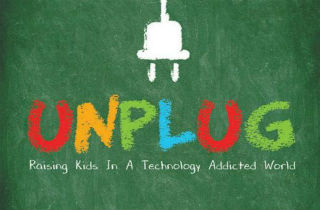By Lydia Magdeska
Is Technology Bad?
No… Yes… Sometimes?
Today’s children spend their lives connected to the net. How can we as parents raise our children into adults who control technology (rather than vica versa)? Lucky for you, we have recently read – and endorse – a book that outlines guidance on tech for parents!
Just keep reading our book review, and if you have any additional questions for us, or want to reach out to the author… post to us in the comments section at the end. We try to respond to all legitimate, real-life questions personally and promptly.
Why You Should Buy the Book, ‘Unplug’
We’ve recently come across a book that helps you sift through the maze of technology related issues. It even defines what technology is. ‘Unplug: Raising Kids in a Technology Addicted World’ by Lisa K. Strohman, J.D., Ph.D. and Melissa J. Westendorf, J.D., Ph.D. is a book that can guide you and help you to:
- take control over devices
- not to overuse technology
- find balance between the virtual and real world
- recognize potential technology dangers
- provide tools for teaching
- teach your children to use technology in a productive way
Who should read ‘Unplug’?
Even though, Unplug is written for parents, the authors warmly recommend to anyone who cares for and works with children. I totally agree with them, but also I’ll enlarge this list to include another broad category: Anyone and everyone who wants to make change in their lives by lowering the use of technology (you know you’re included)!
Why we like ‘Unplug’
The big plus of this book are the case scenarios and real life stories which definitely resonate with family life. Regardless of the fact that both authors are highly educated and credentialed in psychology, I like that they speak from personal experience. Somehow they manage to blend personal experience and education in order to create this self-help manual (I believe that it is!) for parents. Also, the style is simple, and easy to understand.
This book won’t tell you exactly how much time your family should spend online or what your technology rules should be, BUT this book will provide tools to help you:
- identify warning signs
- define boundaries for your kids online
- correct problems
- reinforce your family’s guidelines.
How is Technology Dangerous for Our Children?
Lesson No. 1. The first lesson that you probably learned as a kid was: Never talk to strangers. Seems reasonable. Not every apple is bad, but one bad apple can mean big trouble… and you don’t know what a bad apple look like from the outside!
Think today’s kids are complying with Lesson No. 1? Guess what?! Your kids may be going online and connecting with other users… whether they know them personally or not. They interact through social media platforms and hold virtual conversations with people all over the world.
Do you still believe that Lesson No. 1 is inherently respected?
Moreover, technology is often an easy way out. It is common for children to want to use technology more and more once they begin. Imagine a persistent child who wants to watch his/her favorite cartoon for the fourth time in a row, or a teen who continuously ask to play video games on the tablet… These behaviors are annoying but not necessarily show that these children are addicted. And, for parents sometimes it is harder to manage these demands, but the real truth is that it’s easier to say yes. When you allow children to use technology, you have fewer distractions.
Setting Limits on Technology Use
Nowadays, schools require students to use the Internet to:
- conduct research
- complete assignments
- communicate with teachers via e-mail
- track their academic progress
Some schools even have their own platform on the Internet where they promote teaching materials. Other schools are setting up accounts IN OUR KIDS’ NAMES and signing over access to personal information!
Regardless of privacy issues (that’s also covered in the book) the children of today are growing up in an era where a lack of access to the Internet and modern technology will leave them unable to fulfill basic educational requirements. While parents are expected to impose healthy limits on kid’s exposure to technology, they’ll still need to help children develop a modern skill set and understand the usage of new technologies. So, what limits do the authors suggest?
SPOILER ALERT: You’ve got to read the book to find out. On the one hand, this book will help you learn how to set limits for technology use in order to achieve balance between the virtual and real world. On the other hand, it will encourage you not to FEAR technology and under-use it.
Like all messages of moderation, it’s all about finding a balance.
So, Is Technology Bad?
We’ve learned this: The answer is complicated. In a vacuum, no, technology in and of itself is not dangerous. However, each type of electric-technology-device solves problems as well as creates ones.
For example, when you give your kids their own cellphones, you’ll be able to keep track of where they are at all times. At the same time, your kids may talk with whomever they want whenever they want… without you knowing about it.
Questions about the Book, ‘Unplug’
Wondering where to find ‘Unplug: Raising kids in a technology addicted world’? To buy, download and read the book, click this link:
https://www.amazon.com/Unplug-Raising-Technology-Addicted-World-ebook/dp/B013CGVUWK
Are you still concerned that your child has a technology use problem? Please feel free to contact us in the comments section below. We try to provide a personal and prompt answer to all legitimate inquiries.









Related Posts